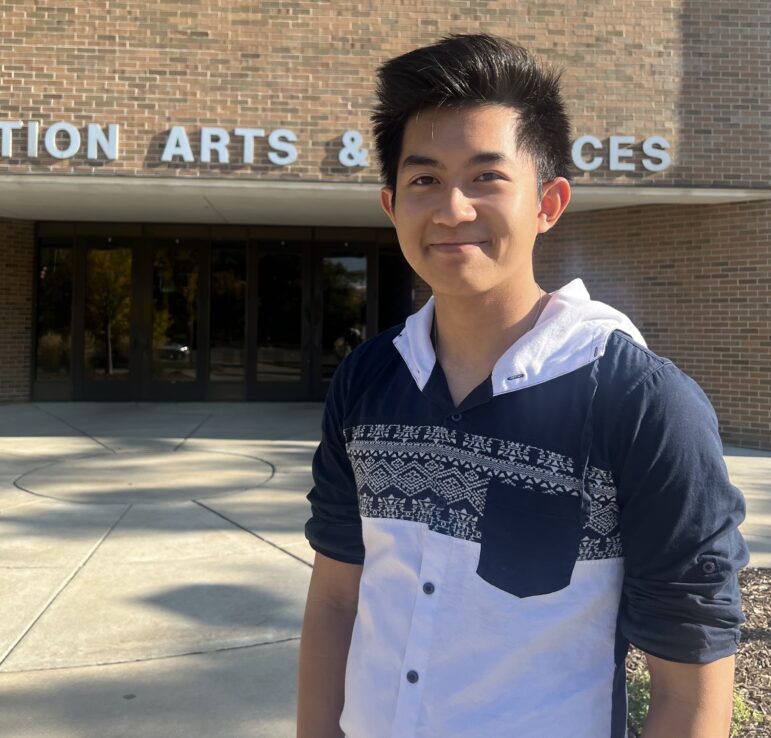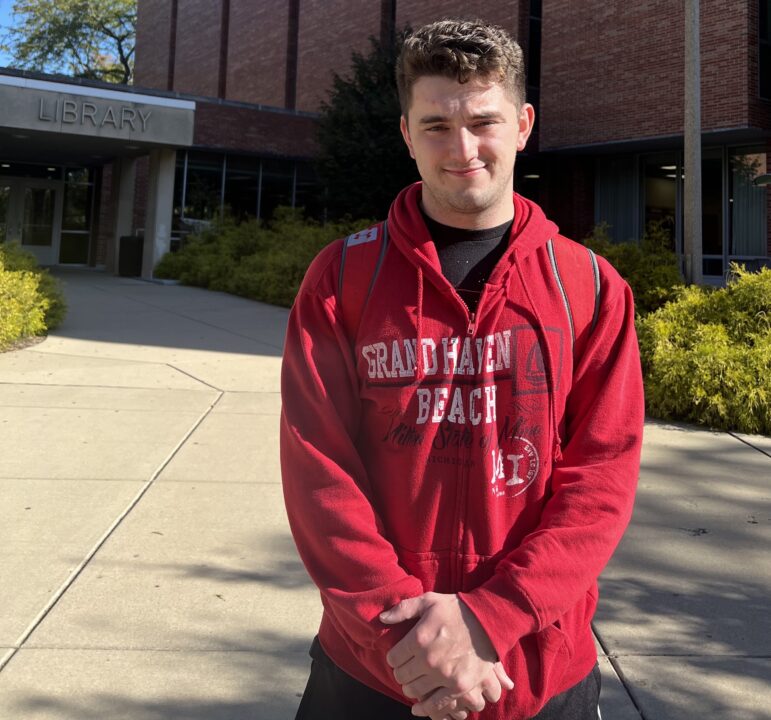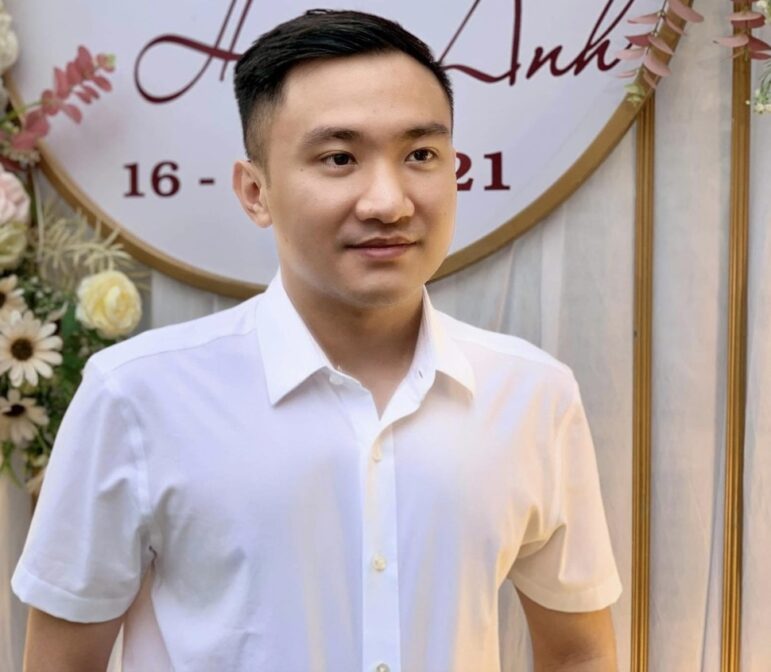
Viet Anh / Spartan Newsroom
Peter Truong studied Vietnamese courses in 2020 and 2021, and he was able to help teach the class for first-year students. Truong was born in Grand Rapids, but his parents are from central Vietnam.Growing up in a household with parents who immigrated from Vietnam, Peter Truong could speak Vietnamese.
But he couldn’t read or write it. So when he texted his mother in English, he said she often didn’t understand. He’d turn to Google Translate, but he said those translations weren’t always good.
And when he spoke Vietnamese with family members, he said he often felt left out with big words. He didn’t know as much as he thought he did.
So Truong, a first-year graduate student at Michigan State University studying advertising and public relations, enrolled in a Vietnamese language class through MSU’s Community Language School.
“I felt very disconnected from my family, and I owe them to learn the language,” said Truong, who took courses in fall 2020 and spring 2022.
Interest in Vietnamese is growing thanks in part to interest from students with Vietnamese heritage and a growing number of students from Vietnam attending U.S. colleges.
Vietnamese students are now the fifth largest group of foreign students in the U.S., according to a Nov. 18 media release by the U.S Embassy and Consulate in Vietnam. Embassy officials say that’s “a key indicator of deepening bilateral ties.”
There were more than 20,700 Vietnamese students among 948,000 international students in the United States during the 2020-2021 academic year, according to data from the Institute of International Education. Embassy officials said those numbers are proof of strong cooperation between the two nations, which signed the U.S.-Vietnam Comprehensive Partnership, a framework for growing relations between the nations, nearly a decade ago.
Vietnamese is one of eight language courses offered through the Community Language School, a program of the Center for Language Teaching Advancement in the College of Arts & Letters. The center was awarded a grant of more than $675,o0o from the U.S. Department of Education to support teaching “less commonly taught languages.”
Truong, who was born in Grand Rapids, said it is important for him to “use Vietnamese language in the real world” as a first-generation Vietnamese American. His family is from Hue in the center of Vietnam.
Some of his cousins combine Vietnamese and English in communications, but Truong said he wants to “speak in full Vietnamese. I don’t like to mix.”
“I thought it best to learn Vietnamese somewhere professionally for that reason,” he said.
Truong assisted a Vietnamese instructor to teach courses for beginners in fall 2021 and 2022. He said he wants to go to Vietnam one day, although his family so far has prohibited the trip.
“I want to know where my family came from, because they’ve only been in Hue their whole lives,” he said. “I am eager to know more about my culture. I wanted to understand the importance of where we came from as well.”
Truong said the language courses helped him understand the meaning of Vietnamese songs he grew up with. His favorite song is “Xuan Nay Con Khong Ve,” which translates to “I will not come home this spring.” The song is about a Vietnamese soldier’s sadness when he could not come home to celebrate the new year festival with his mother and family. Instead, he had to stay with his comrades on the battlefield of the Vietnam War in 1969.
“It’s beautiful to the ear, but it’s so sad when you actually read the lyrics,” he said. “I felt weirded out because now I understand the meaning of the song. I just never knew what it was.”

Viet Anh / Spartan Newsroom
Elijah Savoie is one of students taking a first-year Vietnamese course at Michigan State University during the fall semester this year.Michigan State senior Elijah Savoie took the first year of Vietnamese during the fall semester this year so that he could better communicate with his girlfriend’s parents, who are from Vietnam. Savoie is in his final year of the electrical engineering program at MSU.
He said his girlfriend doesn’t speak a lot of Vietnamese, but her parents do. Her dad is not fluent in English, so Savoie said he needs to learn Vietnamese to better understand their conversations. The family also plans to take him to Vietnam for a visit, so he “wants to be able to fend for myself a little bit.”
Savoie said his class has about 25 students from different universities in the U.S. The program largely consists of online coursework, where they learn speaking, listening, writing and reading. They also meet once a week in a group Zoom call to test their speaking skills.
Savoie said the nice thing about Vietnamese language is it has 29 letters and they’re all phonetic, using special signs to represent the sounds made by the voice in speech. Once learners know those letters and the sounds they make, they can read aloud.
“However, the main struggle is getting the pronunciations right and the accent right,” he said.
Savoie said he found it “a bit hard” to catch up when most of his classmates are Vietnamese with at least some experience of speaking the language as children.
“I’m a lot better at reading than listening,” he said. “But I think that’s just because I spend so much time practicing assignments.”

Courtesy of Hoang Thanh Tung / Spartan Newsroom
Hoang Thanh Tung is instructor of Vietnamese courses at MSU. He said while competition between universities in teaching Vietnamese classes is beneficial for students, cooperation is also important for them.Hoang Thanh Tung, an assistant instructor of two courses in fall 2022, is in Vietnam and working remotely. He is teaching two levels of classes, one for beginners and the other for more advanced beginners.
In the class for beginners, Hoang said about 80% of students are Vietnamese or they have Vietnamese heritage. There are five students at MSU, the rest are from other universities.
“But one thing I can say is that they all show curiosity about the language,” Hoang said, “because Vietnamese is both similar and different from English, which is the language that they use every day.”
Hoang said MSU started collaborating with other universities in the Big Ten to offer online courses around eight years ago. He said he has noticed Vietnamese classes offered at some elite universities, including Ivy League schools, so he believes interest in the language will increase.
Hoang said MSU is pioneering a project to offer educational materials to other institutions.
“It would certainly promote and encourage other organizations and universities to collaborate, to offer the students the most effective learning experience and materials,” he said.